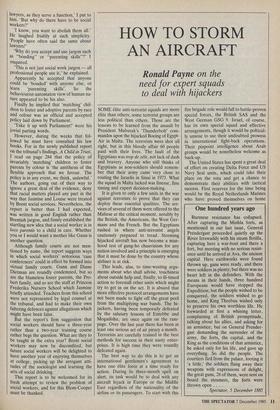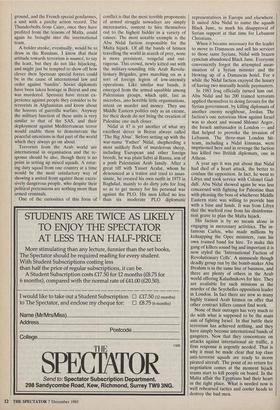HOW TO STORM AN AIRCRAFT
Ronald Payne on the
need for expert squads to deal with hijackers
SOME elite anti-terrorist squads are more elite than others; some terrorist groups are less political than others. Those are the lessons to be learned from the assault by President Mubarak's 'Thunderbolt' com- mandos upon the hijacked Boeing of Egypt- Air in Malta. The terrorists were shot all right, but in this bloody affair 60 people paid with their lives. The fault of the Egyptians was trop de zele, not lack of dash and bravery. Anyone who still thinks of Egyptians as non-soldiers should remem- ber that their army came very close to routing the Israelis in Sinai in 1973. What the squad in Malta lacked was finesse, fine timing and expert decision-making.
It is given to only a few units in the war against terrorists to prove that they can deploy these essential qualities. The ser vices of several of them were offered to the Maltese at the critical moment, notably by the British, the Americans, the West Ger- mans and the French. But the Egyptians rushed in where anti-terrorist angels cautiously prepared to tread. Storming hijacked aircraft has now become a man- hood test of gung-ho chauvinism for any nation involved and a principle is emerging that it must be done by the country whose airliner is at risk.
This leads, alas, to time-wasting argu- ments about who shall advise, touchiness about outside help and, finally, to ill-timed action to forestall other units which might try to get in on the act. It is absurd that more effective protocol arrangements have not been made to fight off the great peril from the multiplying war bands. The hi- jackers, having been temporaily defeated by the salutary lessons of Entebbe and Mogadishu, are once again on the ram- page. Over the last year there has been at least one serious act of air piracy a month. Terrorists are carefully trained in the best methods for success in their nasty enter- prises. It is high time they were roundly defeated again.
The best way to do this is to get an international gentlemen's agreement to have one elite force at a time ready for action. During its three-month spell on alert, its task would be to deal with any aircraft hijack in Europe or the Middle East regardless of the nationality of the airline or its passengers. To start with this fire brigade role would fall to battle-proven special forces, the British SAS and the West German GSG 9. Israel, of course, has its own special squad and effective arrangements, though it would be poltical- ly unwise to use their undoubted prowess in international fight-back operations. Their pinpoint intelligence about Arab groups would be nonetheless welcome as back-up.
The United States has spent a great deal of effort on creating Delta Force and US Navy Seal units, which could take their place on the rota and get a chance to demonstrate their abilities. with tactical success. First reserves for the time being would be the Royal Netherlands Marines who have proved themselves on home ground, and the French special gendarmes, a unit with a patchy action record. The Thunderbolts from Cairo, once they have profited from the lessons of Malta, could again be brought into the international team.
A bolder stroke, eventually, would be to draw in the Russians. I know that their attitude towards terrorism is nuance, to say the least, but they do not like hijacking, and might just be tempted to show off how clever their Spetsnaz special forces could be in the cause of international law and order against 'bandits'. Soviet diplomats have been taken hostage in Beirut and one was murdered. Spetsnaz have recent ex- perience against people they consider to be terrorists in Afghanistan and know about the horrors of guerrilla warfare. Anyway the military function of these units is very similar to that of the SAS, and their deployment against Mediterranean terror would enable them to demonstrate the peaceful intentions in that part of the world which they always go on about.
Terrorists from the Arab world are international in organisation and the re- sponse should be also, though there is no point in setting up mixed squads. A rotat- ing duty squad from one country at a time would be the most satisfactory way of showing a united front against these exces- sively dangerous people, who despite their political pretensions are nothing more than armed criminals.
One of the curiosities of this form of conflict is that the most terrible proponents of armed struggle nowadays are simply mercenaries, content to hire themselves out to the highest bidder in a variety of causes. The most notable example is the Abu Nidal faction responsible for the Malta hijack. Of all the bands of hitmen travelling the world in search of prey, none is more persistent, vengeful and out- rageous. This crowd, newly kitted out with the military-sounding title Arab Revolu- tionary Brigades, goes marching on as a sort of foreign legion of low-intensity operations. Like similar war bands, it emerged from the armed squabble among Palestinian groups, which split, fast as microbes, into horrible little organisations, intent on murder and money. They use Middle Eastern politics only as an excuse, for their deeds do not bring the creation of Palestine one inch closer.
Nidal at 47 is yet another of what my excellent driver in Beirut always called `The Big Abus'. Before setting up with the war-name 'Father' Nidal, shepherding a most unlikely flock of murderous sheep, including European and other foreign breeds, he was plain Sabri al-Banna, son of a posh Palestinian Arab family. After a great tiff with Yasser Arafat, whom he denounced as a traitor and tried to assas- sinate, he created his own outfit in 1973 in Baghdad, mainly to do dirty jobs for Iraq so as to get money for his personal war against the PLO. His men killed no less than six moderate PLO diplomatic representatives in Europe and elsewhere. It suited Abu Nidal to name the squads Black June, to mark his disapproval of Syrian support at that time for Lebanese Christians.
When it became necessary for the leader to move to Damascus and sell his services to those same Syrians, Nidal with brazen cynicism abandoned Black June. Everyone conveniently forgot the attempted assas- sination of a Syrian minister and the blowing up of a Damascus hotel. For a while the Nidal faction enjoyed the luxury of having two mutually hostile paymasters.
In 1983 Iraq officially turned him out. Abu Nidal and his 200 trained terrorists applied themselves to doing favours for the Syrian government, by killing diplomats of another enemy neighbour, Jordan. The faction's one notorious blow against Israel was to shoot and wound Shlomo Argov, the Israeli ambassador in London — and that helped to provoke the invasion of Lebanon. The three-man London hit- team, including a Nidal kinsman, were imprisoned here and in revenge the faction has killed two British diplomats, one in Athens.
A year ago it was put about that Nidal had died of a heart attack, the better to confuse the opposition. In fact, he went to Libya and took service with Colonel Gad- dafi. Abu Nidal showed again he was less concerned with fighting for Palestine than with pleasing the boss of whichever Middle Eastern state was willing to provide him with a base and funds. It was from Libya that the warlord rose from his disinforma- tion grave to plan the Malta hijack.
His faction is by no means alone in engaging in mercenary activities. The in- famous Carlos, who made millions by kidnapping the Opec ministers, runs his own trained band for hire. To make this gang of killers sound big and important it is now styled the 'International Faction of Revolutionary Cells'. A minuscule though deadly group run by the bomb-maker Abu Ibrahim is in the same line of business, and there are plenty of others in the Arab world offering Kalashnikovs for hire. They are available for such missions as the murder of the Seychelles opposition leader in London. In fact there are now so many highly trained Arab hitmen on offer that other contract killers cannot find work.
None of their outrages has very much to do with what is supposed to be the main aim of fighting Israel. In that battle their terrorism has achieved nothing, and they have simply become international bands of gangsters. Now that they concentrate on attacks against international air traffic, a firm response is urgently needed. That is why it must be made clear that top class anti-terrorist squads are ready to storm pirated aircraft. The point of no return for negotiation comes at the moment hijack teams start to kill people on board. In the Malta affair the Egyptians had their heart in the right place. What is needed now is well rehearsed tactics and cooler heads to destroy the bad men.



































































 Previous page
Previous page